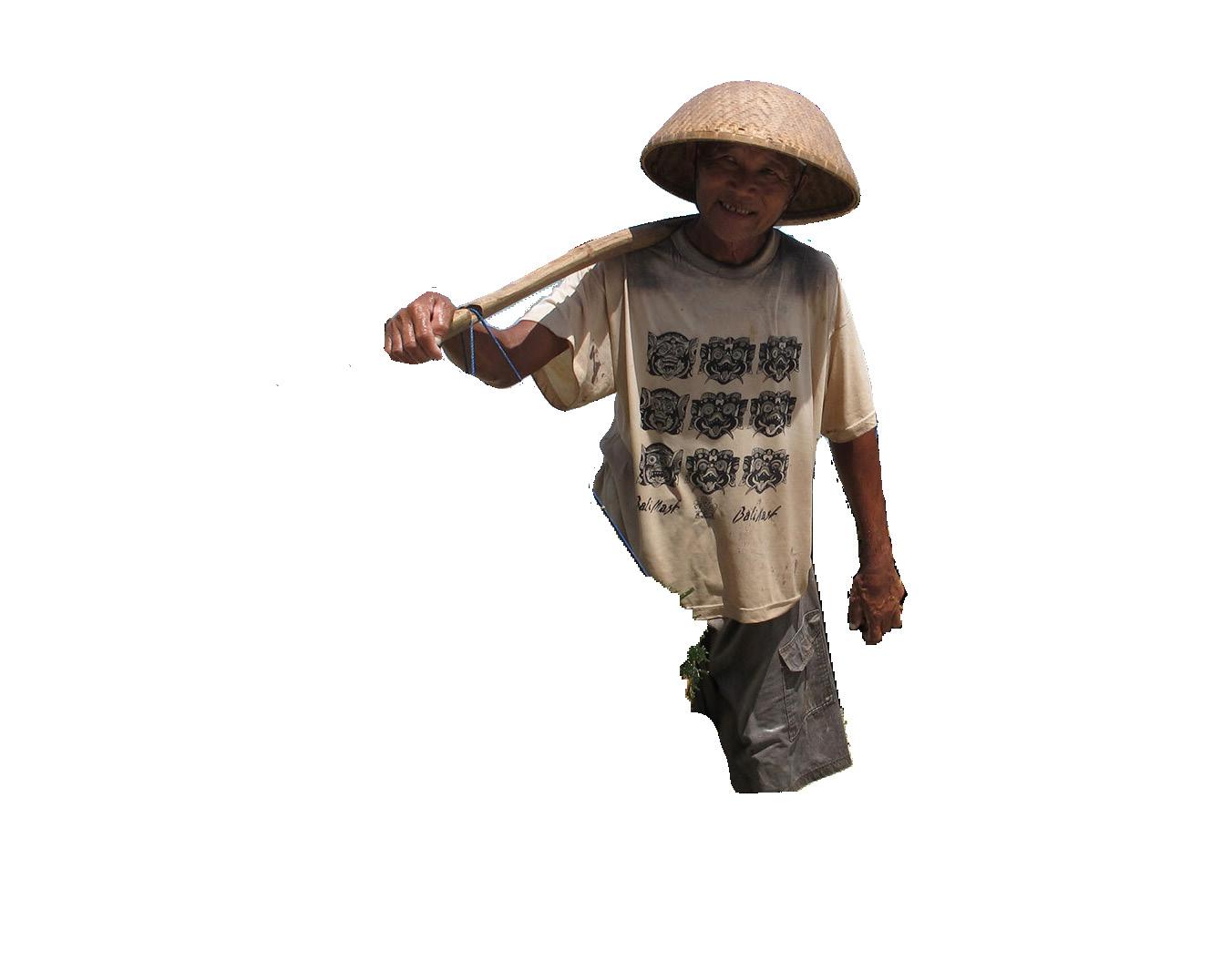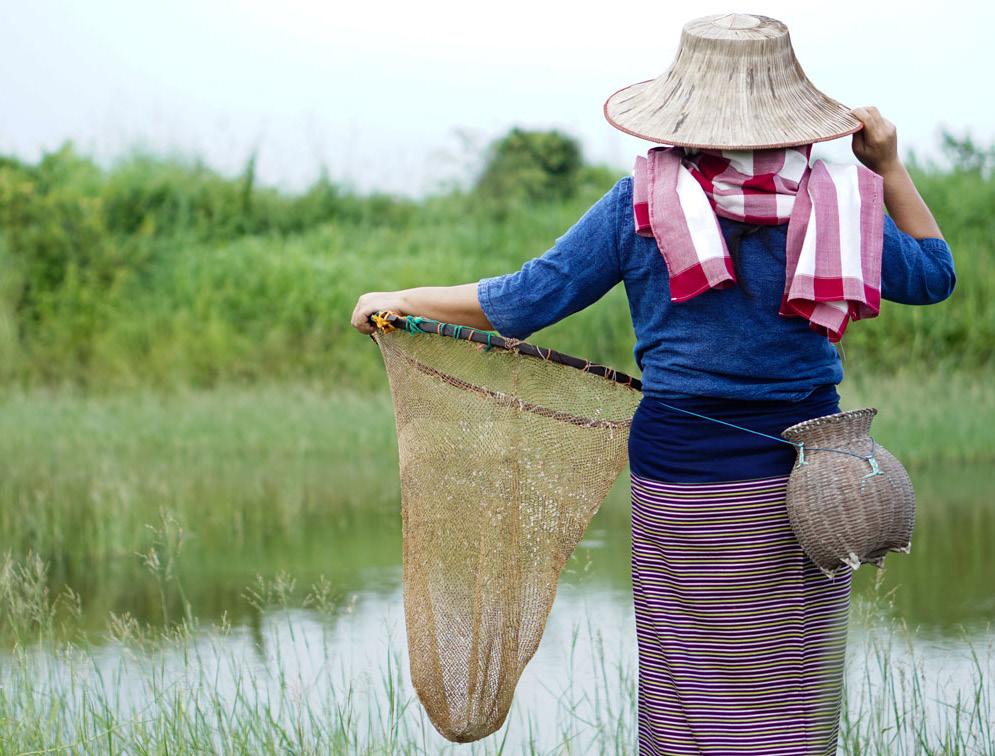AQUADAPT
Nature-based Climate Solutions in Aquaculture Food Systems in Asia-Pacific
Jointly funded by IDRC and the Government of Canada, AQUADAPT is a four-year partnership (2023–2027) that addresses the intertwined critical challenges of climate change, biodiversity loss, and food insecurity through applied research on naturebased solutions in aquaculture for all genders and marginalized groups in Southeast Asia and the Pacific region.
idrc-crdi.ca/initiative/aquadapt


Aquaculture is the fastest-growing food sector globally.
Rising demand for aquatic foods requires a massive increase in production, specifically in Asia, where the majority of the world’s aquaculture is concentrated. While aquaculture’s contributions to food security and incomes are essential, the sector’s rapid growth in AsiaPacific risks deepening climate change vulnerabilities and exacerbating environmental degradation and social inequality.
Nature-based solutions (NbS) in aquaculture have the potential to address these challenges while delivering livelihood and biodiversity co-benefits. Yet, more knowledge, policies, and incentives are needed to enable access and adoption, particularly for small and medium-scale aquafarms.

What are nature-based solutions in aquaculture?
NbS in aquaculture are actions to protect, conserve, restore, and sustainably manage natural or modified aquatic ecosystems while supporting the cultivation of species for food security and livelihoods.
NbS have been recognized globally for their critical role as a climate solution. Yet, NbS in aquaculture is relatively new and not well understood. Through AQUADAPT, IDRC aims to build a critical evidence base and shared vision of and commitment to socially inclusive NbS in aquaculture.
How is AQUADAPT advancing nature-based solutions in aquaculture?
AQUADAPT’s Overall Objective
To enable more resilient and sustainable aquaculture food systems by harnessing the potential of NbS for climate-vulnerable communities, including people of all genders and marginalized groups, in Asia-Pacific.
AQUADAPT’s Specific Objectives
Build Knowledge
To generate new knowledge on how socially inclusive NbS in aquaculture can contribute to climate change adaptation, biodiversity conservation, and food and nutrition security.
Enable Access
To enhance equitable access to the benefits of socially inclusive NbS in aquaculture for all genders and marginalized groups (e.g., youth, Indigenous Peoples) through inclusive technologies, policies, markets, and finance.
Develop a Shared Vision
To inform public and private stakeholders on socially inclusive NbS innovations in aquaculture, how to implement and enable them, and how to assess their benefits and trade-offs.
Where does AQUADAPT support research?
Thailand
Cambodia
Malaysia
Vietnam
Philippines
Indonesia
AQUADAPT has a diverse portfolio of 11 applied, collaborative, and results-oriented research projects in Cambodia, Fiji, Indonesia, Kiribati, Malaysia, Philippines, Thailand, Samoa, Solomon Islands, and Vietnam, which includes over 35 partner organizations.
Kiribati
Solomon Islands
Fiji Samoa
The AQUADAPT Program also employs a series of cross-cutting approaches:
Creating an evidence base on NbS
Coordinating knowledge management and learning
Facilitating cross-program transdisciplinary collaboration through a portfolio approach

Strengthening capacity for gender equitable and socially inclusive NbS
Catalyzing cross-sectoral partnerships through knowledge brokerage

 © Chatta Duangsuwan, USER
© Hanoi Photography / Adobe Stock © Nick Paul, UniSC
© Chatta Duangsuwan, USER
© Hanoi Photography / Adobe Stock © Nick Paul, UniSC

How are AQUADAPT projects driving innovations on nature-based solutions (NbS) in aquaculture?
2
Nature-based practices and aquaculture adaptation to climate change in Thailand and Vietnam
Lead Institution: Chiang Mai University, Thailand
Countries of focus: Thailand and Vietnam
The Unit for Social and Environmental Research (USER) at Chiang Mai University and partners seek to increase the available sustainable options for small and medium-scale aquaculture farms facing climate change challenges in Thailand and Vietnam. They will enhance the resilience of aquaculture stakeholders by supporting the innovation, evaluation, and adoption of inclusive, nature-based practices. The project members are assessing NbS’ potential to address climate change challenges under different ecological, market, and social conditions, as well as obstacles and incentives to innovation and adoption at different scales. They especially seek to understand how NbS may promote more just and inclusive development for women, migrant labourers, Indigenous Peoples, and other marginalized stakeholders. In this way, the project will contribute to making aquaculture development both people-centred and nature-based.
Website: https://aquadapt.org/
Social media:
Making the monitoring of nature-based climate solutions in aquaculture in Southeast Asia more gender-responsive: What gets measured, gets done
Lead Institution: Asian Institute of Technology (AIT)
Countries of focus: Philippines, Thailand, and Cambodia
Led by the Gender in Aquaculture and Fisheries Section (GAFS) of the Asian Fisheries Society and administered at AIT, this project challenges how monitoring is being conceptualized and carried out, developing a gender monitoring schema to ensure the integration of gender equity and social inclusion in NbS in aquaculture systems and projects. Taking women’s and men’s specific needs into account, the monitoring schema aims to capture the nuanced and intersectional processes in which women’s empowerment is realized and show how gender responsive monitoring schema can prove effective for environmental outcomes. The project will pilot the monitoring schema in three locations: Philippines (seaweed), Thailand, and Cambodia (rice fish).
Website: https://gena-project.ait.ac.th/
Social media:
Leveraging climate-smart shrimp aquaculture as an inclusive nature-based climate solution for smallscale farmers in coastal Indonesia
Lead Institution: World Resources Institute (WRI) Indonesia
Country of focus: Indonesia
WRI Indonesia and partners are building resilience by integrating mangrove restoration with shrimp aquaculture as an alternative to conventional shrimp farming, which degrades these valuable ecosystems. Mangroves, combined with supportive infrastructure, help reduce contamination from shrimp ponds by filtering water and can protect against storms and floods. This project seeks to identify and improve the most cost-effective, gender-responsive, and naturefriendly strategies while building the capacity of small-scale aquafarmers to help enhance coastal community resilience.
Website: https://wri-indonesia.org/id
Social media:
4
Enhancing climate resilience in Malaysian shrimp coastal communities through quorum sensing properties in algal integrated multitrophic aquaculture
Lead Institution: Universiti Putra Malaysia (UPM)
Countries of focus: Malaysia
UPM and partners are enhancing the climate resilience of Malaysian shrimp coastal communities by testing, developing, and training the communities on integrating algae-based quorum sensing inhibitors (QSI) into integrated
multitrophic aquaculture systems (IMTA). In multitrophic systems, one species’ waste (e.g., shrimp) feeds others (e.g., seaweed or “macroalgae”), reducing water contamination and enhancing productivity. Not only will algae-based products supply additional income opportunities, but researchers will also test heat-sensitive algae as a climate change adaptation and alternative to antibiotic overuse. Algae can interfere with the communication of pathogenic bacteria (“quorum sensing”), potentially controlling diseases and reducing antimicrobial resistance.
5
Climate-Adaptive, Inclusive, Nature-based Aquaculture (CAINA) in Malaysia and Solomon Islands
Lead Institution: WorldFish
Countries of focus: Malaysia and Solomon Islands
WorldFish and partners are developing clear standards for NbS in aquaculture and tools to measure their environmental, social, and economic performance, including their contribution to climate adaptation. This will help ensure that the benefits of NbS are maximized while addressing potential trade-offs. Definitions and standards will be tested and refined through case studies in Malaysia and the Solomon Islands. The team will also develop a comprehensive survey of current aquaculture activities in these countries and assess their current and future vulnerabilities to climate change. Overall, the project will identify and develop pathways for scaling NbS in Southeast Asia and the Pacific (SEAPAC).

AQUA-Pearl: Scaling up community-led naturebased oyster aquaculture for climate resilience in Fiji
Lead institution: International Institute for Sustainable Development (IISD)
Country of focus: Fiji
IISD, partners in Fiji, and the local private sector are supporting women’s livelihoods by scaling up inclusive, community-led aquaculture that integrates NbS for adaptation such as innovative black-lip oyster pearl and meat production systems. In addition to generating community livelihoods and exploring new domestic and international market opportunities for oyster products, the team is improving environmental resilience to climate change and other pressures by restoring watersheds upstream of aquaculture farms.
Website: AQUA-Pearl | International Institute for Sustainable Development (iisd.org)
Social media:
7
Building an evidence base for inclusive naturebased climate solutions in small-scale aquaculture for sustainable aquatic food systems in the Philippines and Cambodia
Lead Institution: International Institute of Rural Reconstruction (IIRR)
Countries of focus: Philippines and Cambodia
IIRR is developing an evidence base on NbS in small-scale aquaculture in the Philippines and Cambodia, working in
five action-research pilot sites – three in the Philippines and two in Cambodia. Innovations to be tested include rice-fish polycultures in freshwater ponds in rice paddies and diversified aquacultural systems adapted to peatlands, mangroves, brackish water, and lakes. With the support of partner networks, the team will create a knowledge base for wider dissemination in the Southeast Asian region.
Circular economy and feed management approaches for inclusive and sustainable development of marine aquaculture in Vietnam
Lead institution: James Cook University (JCU)
Country of focus: Vietnam
JCU and the Research Institutes for Aquaculture No. 1, 2, and 3 are examining the ecological and economic potential of circular approaches to fish feeding for grouper and other marine species. Specifically formulated fish feeds decrease risks of disease and eutrophication inherent to feeding wildcaught whole fish. By utilizing byproducts from aquaculture and other industries, a circular economy approach can further enhance nutrient capture in the human food chain and decrease the environmental footprint of fish farming. By optimizing feeding techniques and developing nutrient dense pellet formulas, research will enable small farmers to reduce costs, increase yields, and improve water quality while creating new opportunities for the local private sector.

Transforming women’s seaweed enterprises into nature-based solutions for Fiji, Samoa, and Kiribati
Lead institution: University of the Sunshine Coast (UniSC)
Countries of focus: Fiji, Samoa, and Kiribati
UniSC’s Seaweed Research Group and partners in Fiji, Samoa, and Kiribati are supporting women’s livelihoods and improving ecologies by developing new seaweed production and processing techniques. Combining traditional knowledge, life cycle and value chain analysis, and biochemical data, researchers are developing and testing nutritious food products and evaluating seaweed use in compost and fertilizer for agriculture. They are also identifying new market opportunities to enhance the resilience of the regional seaweed industry.
Website: https://www.usc.edu.au/seaweed
Social media:
10
Innovating for equity in nature-based climate solutions in aquaculture food systems in Asia-Pacific
Lead institution: Stockholm Environment Institute (SEI)
Countries of focus: Regional (AQUADAPT portfolio)
SEI is supporting research and practice on advancing gender equality and social inclusion in NbS in aquaculture. The project’s first component will apply a transdisciplinary approach to identify diverse perspectives on nature-based climate challenges and solutions in aquaculture, with a
focus on Thailand and Fiji. The second component will support capacity development and peer-to-peer learning across the AQUADAPT portfolio to promote the effective integration of gender equality and social inclusion (GESI) in AQUADAPT projects.
Website: https://www.sei.org/projects/i4e/
Social media:
11
Knowledge brokering for nature-based solutions (NbS) in aquaculture transformation in AsiaPacific: Support to the Aquaculture Innovation and Investment Hub (AIIH)
Lead institution: Network of Aquaculture Centres in Asia-Pacific (NACA)
Countries of focus: Regional (AQUADAPT portfolio)
NACA, through its Aquaculture Innovation and Investment Hub (AIIH), is supporting knowledge brokerage between AQUADAPT teams and Asia-Pacific aquaculture stakeholders. Launched in 2023, AIIH’s mandate is to catalyze innovation and investment for a more resilient and sustainable regional aquaculture sector. This collaboration will enable AQUADAPT projects to achieve greater impact in Asia-Pacific through exchanges with policymakers, private sector actors, and investors. IDRC’s AQUADAPT, in turn, will support the integration of NbS into the hub’s activities. Through scoping research and stakeholder engagement, AQUADAPT and NACA will identify barriers and pathways to scaling NbS in aquaculture across Asia-Pacific.



